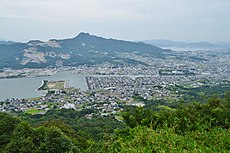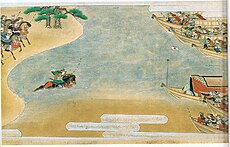Battle of Yashima
You can help expand this article with text translated from the corresponding article in Japanese. (November 2020) Click [show] for important translation instructions.
|
| Battle of Yashima | |||||||
|---|---|---|---|---|---|---|---|
| Part of the Genpei War | |||||||
 Battle of Yashima folding screens | |||||||
| |||||||
| Belligerents | |||||||
| Minamoto clan | Taira clan | ||||||
| Commanders and leaders | |||||||
| Minamoto no Yoshitsune |
| ||||||
| Strength | |||||||
| 140 ships, 1,000 Cavalry, 30,000 horses[2] | Unknown | ||||||
| Casualties and losses | |||||||
| Satō Tsugunobu | Unknown | ||||||
Location within Japan | |||||||
Battle of Yashima (屋島の戦い) was one of the battles of the Genpei War on March 22, 1185, in the Heian period. It occurred in Sanuki Province (Shikoku), which is now Takamatsu, Kagawa.
Background
[edit]Following a long string of defeats, the Taira clan retreated to Yashima, today's Takamatsu, just off the coast of Shikoku. Here they had a fortress, and an improvised palace for Emperor Antoku and the imperial regalia, which they had taken earlier in the war.
Battle
[edit]On the 18th, a Minamoto force tried to cross the sea but many of the boats were damaged in a storm. Kajiwara Kagetoki then suggested adding "reverse oars" to the boats, which prompted an argument from Minamoto no Yoshitsune. Finally after the boats were repaired and despite the high winds, Yoshitsune departed with only five of the 200 boats carrying about 150 of his men. After arriving in Tsubaki Bay, in Awa Province. Yoshitsune then advanced into Sanuki Province through the night reaching the bay with the Imperial Palace at Yashima, and the houses in Mure and Takamatsu.[3]
The Taira were expecting a naval attack, and so Yoshitsune lit bonfires on Shikoku, essentially in their rear, fooling the Taira into believing that a large force was approaching on land. They abandoned their palace, and took to their ships, along with Emperor Antoku and the imperial regalia.[4]
In a memorable account in the Heike monogatari, a "very beautiful lady" in a Heike boat, placed a fan atop a pole, and dared the Minamoto to knock it off. In one of the most famous archery feats in all of Japanese history, Nasu no Yoichi rode out into the sea on horseback, and did just that in one shot.[1] The Minamoto were victorious, but the majority of the Taira fleet escaped to Dan-no-ura, where they were defeated one month later in the Battle of Dan-no-ura.[5][6]
Gallery
[edit]-
Location of the battlefield
-
Movement of Minamoto forces in blue
-
Battle movement at Yashima
-
Nasu no Yoichi firing his famous shot at a fan atop the mast of a Taira ship. From a hanging scroll, Watanabe Museum, Tottori Prefecture, Japan.
-
Battle of Yashima by Utagawa Kunisada
See also
[edit]References
[edit]- ^ a b The Tales of the Heike. Translated by Burton Watson. Columbia University Press. 2006. pp. 126–130. ISBN 9780231138031.
- ^ Japanese Wiki page: On August 7, 1184: 1000 Cavalry departed Kamakura. August 27, 1184, Minamoto no Noriyori entered Kyoto and was appointed as a follow-up messenger, and on September 1, he left Kyoto for Kyushu with more than 30,000 horses.
- ^ Sato, Hiroaki (1995). Legends of the Samurai. Overlook Duckworth. pp. 130–132. ISBN 9781590207307.
- ^ Sansom, George (1958). A History of Japan to 1334. Stanford University Press. pp. 301–302. ISBN 0804705232.
- ^ Turnbull, Stephen (1998). The Samurai Sourcebook. Cassell & Co. p. 204. ISBN 1854095234.
- ^ Turnbull, Stephen (1977). The Samurai, A Military History. MacMillan Publishing Co., Inc. pp. 72–78. ISBN 0026205408.







